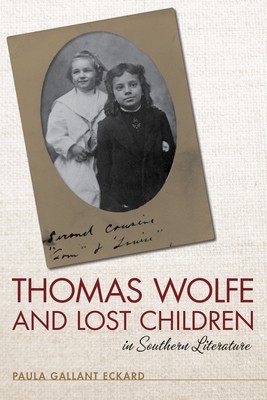
- We will send in 10–14 business days.
- Author: Paula Eckard
- Publisher: Univ Tennessee Press
- ISBN-10: 1621902455
- ISBN-13: 9781621902454
- Format: 16 x 23.1 x 2.3 cm, hardcover
- Language: English
- SAVE -10% with code: EXTRA
Thomas Wolfe and Lost Children in Southern Literature (e-book) (used book) | bookbook.eu
Reviews
Description
First published in 1937, Thomas Wolfe's The Lost Boy gives name to the theme of lost children that has permeated much of southern literature and provides a template for telling their stories. In Thomas Wolfe and Lost Children in Southern Literature, which grew out of many years of teaching The Lost Boy and other works of southern literature, Paula Gallant Eckard uses Wolfe's novel as a starting point to trace thematic connections among contemporary southern novels that are comparably evocative in their treatment of lostness.
Eckard explores six authors and their works: Fred Chappell's I Am One of You Forever, Mark Powell's Prodigals, Kaye Gibbons's Ellen Foster, Sue Monk Kidd's The Secret Life of Bees, Bobbie Anne Mason's In Country, Robert Olmstead's Coal Black Horse, and Lee Smith's On Agate Hill. Though each novel is unique and a product of its own time period, all the novels explored here are cast against the backdrop of the South during eras of conflict and change. Like The Lost Boy, these novels reflect a sense of history, a sense of loss associated with that history, and an innate love of story and narrative, as well as representations of work that historically have defined the lives of individuals and families throughout the South. In its artistic treatment of lostness, The Lost Boy creates a significant literary legacy. As Eckard demonstrates, that legacy continues in the form of these six contemporary authors who, in writing about the South, perpetuate Wolfe's efforts as they also create or find the lost child in new ways.EXTRA 10 % discount with code: EXTRA
The promotion ends in 19d.23:46:40
The discount code is valid when purchasing from 10 €. Discounts do not stack.
- Author: Paula Eckard
- Publisher: Univ Tennessee Press
- ISBN-10: 1621902455
- ISBN-13: 9781621902454
- Format: 16 x 23.1 x 2.3 cm, hardcover
- Language: English English
First published in 1937, Thomas Wolfe's The Lost Boy gives name to the theme of lost children that has permeated much of southern literature and provides a template for telling their stories. In Thomas Wolfe and Lost Children in Southern Literature, which grew out of many years of teaching The Lost Boy and other works of southern literature, Paula Gallant Eckard uses Wolfe's novel as a starting point to trace thematic connections among contemporary southern novels that are comparably evocative in their treatment of lostness.
Eckard explores six authors and their works: Fred Chappell's I Am One of You Forever, Mark Powell's Prodigals, Kaye Gibbons's Ellen Foster, Sue Monk Kidd's The Secret Life of Bees, Bobbie Anne Mason's In Country, Robert Olmstead's Coal Black Horse, and Lee Smith's On Agate Hill. Though each novel is unique and a product of its own time period, all the novels explored here are cast against the backdrop of the South during eras of conflict and change. Like The Lost Boy, these novels reflect a sense of history, a sense of loss associated with that history, and an innate love of story and narrative, as well as representations of work that historically have defined the lives of individuals and families throughout the South. In its artistic treatment of lostness, The Lost Boy creates a significant literary legacy. As Eckard demonstrates, that legacy continues in the form of these six contemporary authors who, in writing about the South, perpetuate Wolfe's efforts as they also create or find the lost child in new ways.

Reviews